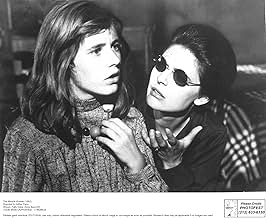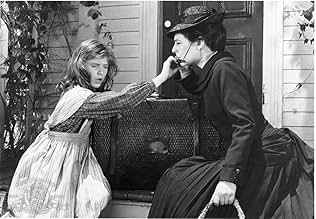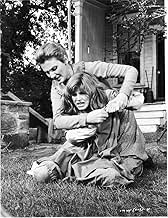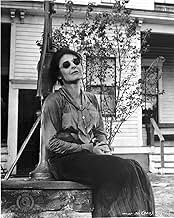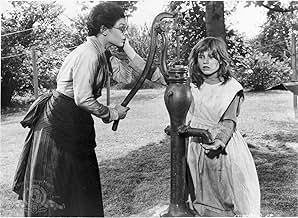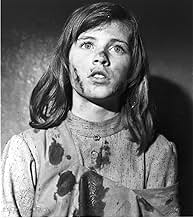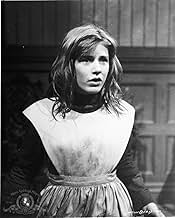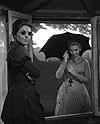IMDb रेटिंग
8.1/10
22 हज़ार
आपकी रेटिंग
अपनी भाषा में प्लॉट जोड़ेंThe story of Anne Sullivan's struggle to teach the blind, deaf and mute child Helen Keller how to understand and communicate.The story of Anne Sullivan's struggle to teach the blind, deaf and mute child Helen Keller how to understand and communicate.The story of Anne Sullivan's struggle to teach the blind, deaf and mute child Helen Keller how to understand and communicate.
- 2 ऑस्कर जीते
- 13 जीत और कुल 13 नामांकन
Maribel Ayuso
- Undetermined Role
- (बिना क्रेडिट के)
Dale Ellen Bethea
- Martha at Age 10
- (बिना क्रेडिट के)
John Bliss
- Admissions Officer
- (बिना क्रेडिट के)
Grant Code
- Doctor
- (बिना क्रेडिट के)
Michael Darden
- Percy at Age 10
- (बिना क्रेडिट के)
Michele Farr
- Annie at Age 10
- (बिना क्रेडिट के)
William F. Haddock
- 2nd Crone
- (बिना क्रेडिट के)
Jack Hollander
- Mr. Anagnos of Perkins School in Boston
- (बिना क्रेडिट के)
Alan Howard
- Jimmie at Age 8
- (बिना क्रेडिट के)
Judith Lowry
- 1st Crone
- (बिना क्रेडिट के)
Helen Ludlam
- 3rd Crone
- (बिना क्रेडिट के)
Beah Richards
- Viney - Keller Maid
- (बिना क्रेडिट के)
फ़ीचर्ड समीक्षाएं
I bought this movie after having not seen it for a while, and watching it again was intensely powerful. I had never cried during the "water" scene, but I did this time. The scene in the dining room is magnificently filmed and exhausting to watch...to think Patty Duke and Anne Bancroft performed that scene every night on Broadway! Supposedly they wore multiple layers of padding. I don't know why they didn't create a new category for the Oscars that year, Best Double Performance in Leading Roles. They both richly deserved the Oscars they won, but I really couldn't choose between a leading role and a supporting role in that movie since Duke and Bancroft created such a beautiful and moving partnership. Having read a great deal about Helen Keller, including her own autobiography, I am still always amazed by her story and accomplishments. This movie is a brilliant testament to human strength.
Although I am a long-time Patty Duke admirer, and thus far from objective, this film still stands the test of time. This is the kind of filmmaking that prompted me to fall in love with the movies. Brilliantly inspired writing by William Gibson, from his equally inspired play. Intelligent, austere direction by Arthur Penn (one of the true gentlemen and masters of the American cinema); Penn had the sense to retain the inate artistry and grit of the original stage play and simply allow the camera to capture the actors' intuitive - albeit, well rehearsed, performances, recreating their stage roles which generated an unheard-of 19 curtain calls when it first graced the stage in its Philadephia opening. The film, in stark, black and white, speaks total reality to the film audience of 1962 - and, of course, well beyond that year. Finally, one would be hard pressed to think of another film that so exquisitely defines the term "2-character" study. Bancroft and Duke deliver A-plus, no bones about it, top-drawer, performances. It is a film about the undaunted human spirit and our need to communicate. Although much has been written about 11-minute breakfast donneybrook, which is certainly wonderful cinema to behold, the entire film is breathtaking from opening credits to the final scenes. I dare anyone to even breathe during the climactic water pump scene when teacher Annie Sullivan finally "connects" and communicates with her "unreachable" charge, the deaf, blind, young Helen Keller. It's an absolutely astonishing, "can't take your eyes off it," moment of celluloid. Duke, Bancroft and Penn worked beatifully to create this incredibly touching masterpiece of dramatic filmmaking, which is not without its moments of "comedy," as all fine dramas are capable of conveying. It is a film which breathes life - and it is especially brought to life by two of the best actresses America has ever produced. The Miracle Worker is a story and film portraying real human courage, patience and individual, personal will. It continues to live in my memory as a work of art that has rarely been equalled before - or since - on screen.
Where do I begin? Shall I speak of Mrs Bancroft's performance,one of the finest you can watch on a screen?Shall I tell about Patty Duke's tour de force?Shall I praise the mind-boggling work of Arthur Penn,directing the long fight around the table?This movie is a miracle in itself.Behind her dark spectacles,the teacher hides buried terrors,that's why she's bound to understand her unusual pupil.She knows that the solution to her problems lies in herself,that the family is a prison .The parents do not see(or do not want to see) that they erect a wall between their daughter and the world outside by poisoning her with protection.That's why Annie seems brutal,hard on Helen.She could not have broken the wall if she had been a "nice" teacher.Among all Penn's great movies ,"miracle worker" is the only one that has an optimistic end.Since,other directors have tackled autism(children of a lesser God,rain man)but no one has surpassed this black and white gem.
Powerfully directed by Arthur Penn and supported by two Oscar-winning performances, The Miracle Worker dramatizes the early years of Helen Keller, the blind and deaf mute who became a famous author and prominent Socialist. Anne Bancroft's first lead role is as Anne Sullivan, Helen's lifelong teacher and friend and her performance is compelling. Patty Duke is also outstanding as Helen, portraying the disturbed child as she works to overcome bad manners and temper tantrums, the result of being overly indulged by her well meaning but ineffective parents. Moving into a small cottage away from her parents, Anne, who was partially blind herself, assists Helen with some tough love and begins to teach her to spell with her fingers.
Until this point, Helen had no understanding of the meaning of words. This changed when Anne led her to the water pump and spelled out the word water as she pumped the water over Helen's hand. She is said to have learned thirty words the same day and eventually learned to read. In 1904 Helen graduated from Radcliffe College, becoming the first deaf-blind person to earn a Bachelor of Arts degree. The film could have easily descended into melodrama, but Penn keeps his focus and the result is enormously moving without being maudlin. The Miracle Worker is a miracle.
Until this point, Helen had no understanding of the meaning of words. This changed when Anne led her to the water pump and spelled out the word water as she pumped the water over Helen's hand. She is said to have learned thirty words the same day and eventually learned to read. In 1904 Helen graduated from Radcliffe College, becoming the first deaf-blind person to earn a Bachelor of Arts degree. The film could have easily descended into melodrama, but Penn keeps his focus and the result is enormously moving without being maudlin. The Miracle Worker is a miracle.
Arthur Penn's superb, emotionally devastating screen version of William Gibson's play about the early life of Helen Keller and of how a great dedicated teacher, Annie Sullivan, dragged her kicking, if not necessarily screaming, out of her world of darkness. Penn's style is spare and unsensational, (even finding a good deal of humour in the early encounters between teacher and pupil; deaf, dumb and blind Keller may be but she is as wily as a cat and runs rings round Sullivan). The black and white images are straightforward and uncluttered and have the power of the images in silent cinema. As Sullivan and Keller, Anne Bancroft and Patty Duke are both astonishing. There is a rapport between these two actresses that seems to transcend mere 'acting' and raises the film to an altogether higher, more deeply moving plain.
क्या आपको पता है
- ट्रिवियाMark Twain was the first person to refer to Anne Sullivan as "the miracle worker". Twain was a friend of Helen Keller.
- गूफ़Annie Sullivan has to look up the word discipline in a dictionary later in the film even though she's used it in a letter near the beginning; however, she remarks that she must know how to spell it before teaching it to Helen, and may have simply used her best guess in the letter since nothing was at stake.
- भाव
Annie Sullivan: Pity? For this tyrant? The whole house turns on her whims! Is there anything she wants she doesn't get? I'll tell you what I pity: that the sun won't rise and set for her all her life, and every day you're telling her it will! What good will your pity do when you're under the strawberries, Captain Keller?
- कनेक्शनEdited into Histoire(s) du cinéma: Le contrôle de l'univers (1999)
- साउंडट्रैकHush, Little Baby
(uncredited)
Traditional Southern lullaby
Music adapted by Don Costa
Lyrics by Arthur Siegel
Sung by Anne Bancroft
Also played in the score
टॉप पसंद
रेटिंग देने के लिए साइन-इन करें और वैयक्तिकृत सुझावों के लिए वॉचलिस्ट करें
विवरण
बॉक्स ऑफ़िस
- बजट
- $5,00,000(अनुमानित)
- दुनिया भर में सकल
- $4,139
- चलने की अवधि
- 1 घं 46 मि(106 min)
- रंग
- ध्वनि मिश्रण
- पक्ष अनुपात
- 1.85 : 1
इस पेज में योगदान दें
किसी बदलाव का सुझाव दें या अनुपलब्ध कॉन्टेंट जोड़ें



